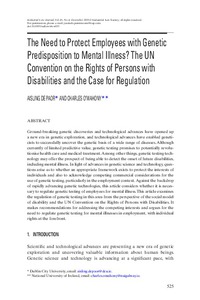The need to protect employees with genetic predisposition to mental illness? The UN Convention on the rights of persons with disabilities and the case for regulation

De Paor, Aisling ; O'Mahony, Charles
2016
45
4
December
525-555
disability ; labour law ; mental disease ; UN Convention
Law
http://dx.doi.org/10.1093/indlaw/dww033
English
"Ground-breaking genetic discoveries and technological advances have opened up a new era in genetic exploration, and technological advances have enabled geneticists to successfully uncover the genetic basis of a wide range of diseases. Although currently of limited predictive value, genetic testing promises to potentially revolutionise health care and medical treatment. Among other things, genetic testing technology may offer the prospect of being able to detect the onset of future disabilities, including mental illness. In light of advances in genetic science and technology, questions arise as to whether an appropriate framework exists to protect the interests of individuals and also to acknowledge competing commercial considerations for the use of genetic testing, particularly in the employment context. Against the backdrop of rapidly advancing genetic technologies, this article considers whether it is necessary to regulate genetic testing of employees for mental illness. This article examines the regulation of genetic testing in this area from the perspective of the social model of disability and the UN Convention on the Rights of Persons with Disabilities. It makes recommendations for addressing the competing interests and argues for the need to regulate genetic testing for mental illnesses in employment, with individual rights at the forefront."
Digital
The ETUI is co-funded by the European Union. Views and opinions expressed are however those of the author(s) only and do not necessarily reflect those of the European Union or the ETUI.